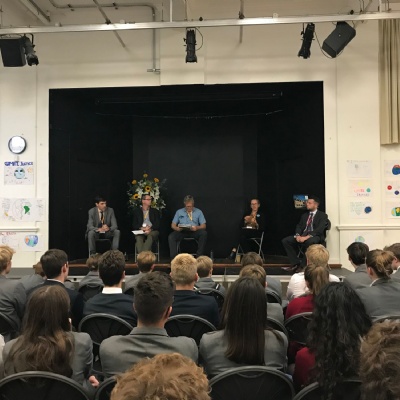Crisis, What Crisis?

Our Academic Enrichment Programme (AEP) event this week was a well-attended and well-received round table debate about climate change. I have always advocated attendance at any talks or presentations by visiting speakers, and I try my best to encourage colleagues to take pupils to events outside school so that they can be exposed to different views and opinions. It was therefore great to see so many pupils at the event, where I hope they shared my view that there was plenty to think about.
I had a rough idea about what I was going to hear, with one panel member alleged to be a climate change denier, one a member of Extinction Rebellion and two others very much sharing the consensus opinion that the planet is warming quicker than it has ever done and it is all our fault, with our industrial machines and love of fossil fuels pumping the atmosphere full of so much carbon dioxide that it is only a matter of time before the ice caps melt and we all drown in a rising sea of our own creation.
But that was not what happened. The man who was supposed to deny climate change didn’t. He agreed that global temperatures are rising, but he said it was nothing to do with CO2. Instead, he believes it is fluctuations in the heat of the sun that are having the impact, with an 85-year time lag in operation between what happens 93 million miles away and what happens here on earth. In about 1950, he argued, there was a rise in solar output, which is what we are feeling now. His view was that in another 50 years it will cool again and we will wonder what all the fuss was about.
It was clear that most of the audience were highly sceptical about such claims and were frustrated by his opinion that there was no point in anyone trying to take any measures to stop the temperature rising because it is way beyond our control. Like Phaethon trying to control the sun chariot for a day, or Icarus flying too close to its heat, this is something we would be better to leave well alone. And then he said he did not own a car and came to us on three buses in a journey of over three hours, which seemed hard to reconcile.
Equally troubling was one of the experts who was absolutely convinced by the science that says it is all our fault. However, when he was asked what we could do to stop the crisis, he said he did not think there was anything of much use. I wasn’t entirely clear if this was because he thought it was simply too late or if he thought that any efforts we could make would lack the required impact, but it seemed a surprisingly defeatist attitude. He did, though, make the very good point that rather than trying to stop the warming, we would be better learning how to adapt to the impact and change the way we live accordingly.
Arguably the best question from the pupils was asked of the panellist who was a member of Extinction Rebellion. What did she think was the point of people glueing themselves to trains and disrupting ordinary people’s lives? The answer was measured and balanced, as might be expected from a professor – not all climate campaigners are teenagers or ‘crusties’. She said that a fire alarm in the middle of the night might be a real nuisance, but if it saved you from a burning building then it was a price worth paying.
I was reminded of the observation from the American cultural anthropologist Margaret Mead, who said: “Never doubt that a small group of thoughtful, concerned citizens can change the world. Indeed, it is the only thing that ever has.”
The final panel member made a pertinent contribution as well when he said that it does not really matter what causes climate change, but it does matter that we take action to find new ways to provide us with energy for the future. The fossil fuels will run out and they cannot be replaced in the same format. We already spend billions on fighting wars in faraway countries to secure supplies and defend the pipelines and tankers that deliver what we need. The pollution from these fuels kills millions of us already, so common sense dictates that we need something cleaner and greener anyway, regardless of whether or not this will cool the planet, which it almost certainly will as well.
It was a genuinely fascinating afternoon, and one that will keep me thinking for a long time to come. So many of us are trapped in what psychologists call a confirmation bias, whereby we get our news from sources with which we already agree, simply reinforcing our existing prejudices. This event was therefore a refreshing chance to hear different views in a measured and sensible format, and for me to be forced to reassess ideas that I have become used to taking for granted, which is always a helpful process.